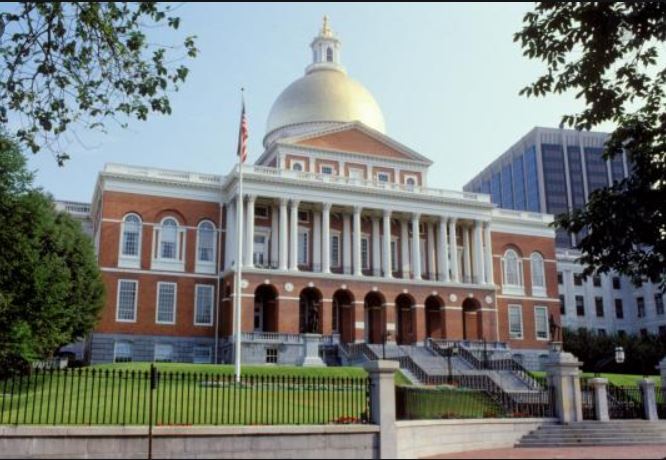16 August 2022

Boston Mayor Michelle Wu addresses an audience during swearing-in ceremonies for Boston Police Commissioner Michael Cox, Monday, Aug. 15, 2022, in Boston.
The city of Boston is seeking state permission to ban fossil fuels from new construction, a step toward reducing climate-harming emissions on a large scale, Mayor Michelle Wu announced Tuesday.
Days after Gov. Baker signed a new climate law allowing 10 cities and towns in Massachusetts to implement such a ban, Wu said she is pushing for the state’s largest city to be included in the pilot project.
Bans of fossil fuel in new buildings, forcing them to rely on alternative forms of heat, chiefly electric heat pumps, has been seen as a way to begin a larger-scale transition away from fossil fuel in homes and commercial businesses. If chosen for the pilot program, Boston would become one of a small handful of major U.S. cities to enact such a ban, along with New York City, Seattle and Washington, D.C.
“Boston must lead by taking every possible step for climate justice to achieve our carbon reduction goals,” Wu said in a statement. “Fossil fuels, including natural gas, are known polluters that have negative implications on the environment and public health, particularly within our environmental justice communities.
Wu announced that the city will file a so-called “Home Rule Petition” with the Legislature, which will make it eligible to take part in the pilot, which exempts labs and medical facilities from a ban. The Wu administration will also start the process of talking with the community, business interests, environmental groups and others to define what a ban would look like in Boston, including setting the bounds of a multi-year timeline to phase out fossil fuels.
Banning fossil fuels from new buildings would help Boston to take a bite out of its biggest source of emissions. The on-site burning of fossil fuels accounts for more than a third of greenhouse gas emissions in Boston, according to the city. And compared to getting existing buildings off of fossil fuels, which represents a logistical—and expensive—challenge, ensuring that new buildings are built climate-friendly is considered low-hanging fruit.
Wu’s announcement was met with enthusiasm from climate advocates. “We must target new buildings as some of the lowest hanging fruit, to achieve zero emissions through equitable electrification,” Michele Brooks, lead Boston organizer with the Massachusetts Sierra Club, said in a statement.
But that’s only if the state chooses Boston to be included in the pilot.
The bill signed last week by Baker gives priority to the first ten communities to file home rule petitions, and ten communities have already taken that step: Cambridge, Newton, Brookline, Lexington, Arlington, Concord, Lincoln, Acton, Aquinnah, and West Tisbury.
According to state Sen. Michael Barrett, who was a lead negotiator of the climate bill, the city of Boston was asked to file a petition months ago, as the climate bill was being crafted, so it could secure a spot in the pilot. The city opted not to, according to a spokesperson for Wu, because it wanted to see the final bill before proceeding.
Slashing emissions from buildings represents a “real leadership opportunity” for the city — one that will be harder to achieve because of Boston’s hesitation in starting the process earlier, he said.
There is still a chance that Boston will be able to join the pilot, though. The climate bill requires that communities meet an affordable housing requirement, and it’s unclear if all of the 10 communities that have filed so far will be able to do so. They will have 18 months to meet the requirement, and if it doesn’t happen, they lose their spot.
After that, any town or city that has gotten local approval for a ban via town meeting or city council and has filed a home rule petition can try to join the ban. The state Department of Energy Resources will get to decide which communities get spots, regardless of the order in which they apply.
Boston may find itself with some competition, according to Lisa Cunningham, a Brookline architect and co-founder of ZeroCarbonMA, a group working with towns to pressure the state to enact more aggressive climate policies.
“Environmental justice communities very much want to move forward on this, and we have a few that we are working with” that could file home rule petitions, Cunningham said. There are several others working on this as well, she said.
By Sabrina Shankman Globe Staff - Boston Globe
Members of the Northeast Hearth, Patio & Barbecue Association (NEHPBA) and its regional Affiliates are the leading companies that produce, sell, or service appliances and accessories in the hearth and barbecue industries in North America. Join today to take advantage of all the benefits your company will receive.
JOIN NOWServicing Massachusetts, Connecticut, New Hampshire, Rhode Island, Vermont, Maine, New York
Copyright © 2025. Northeast Hearth, Patio and Barbecue Association | All rights reserved.